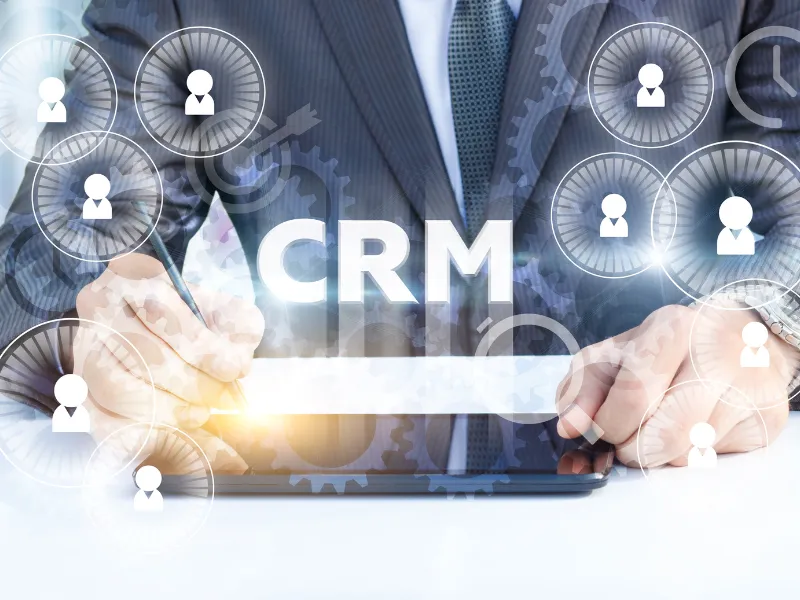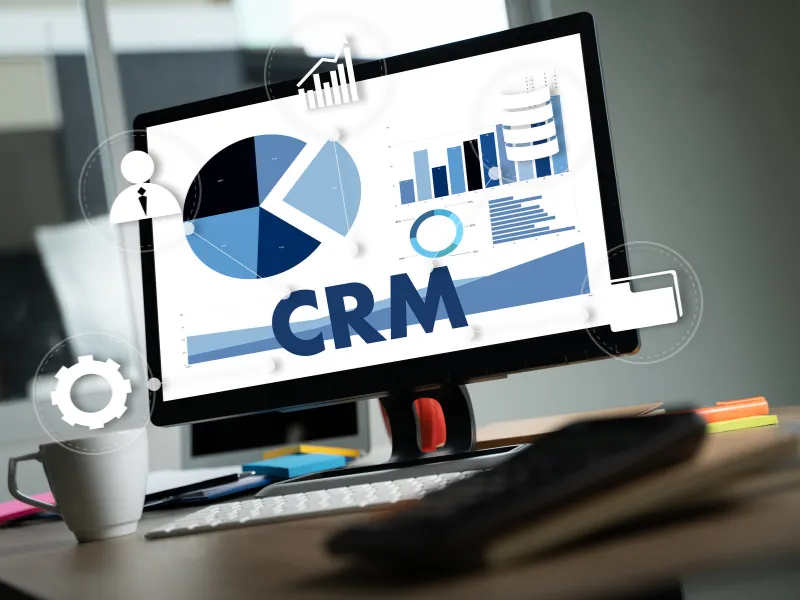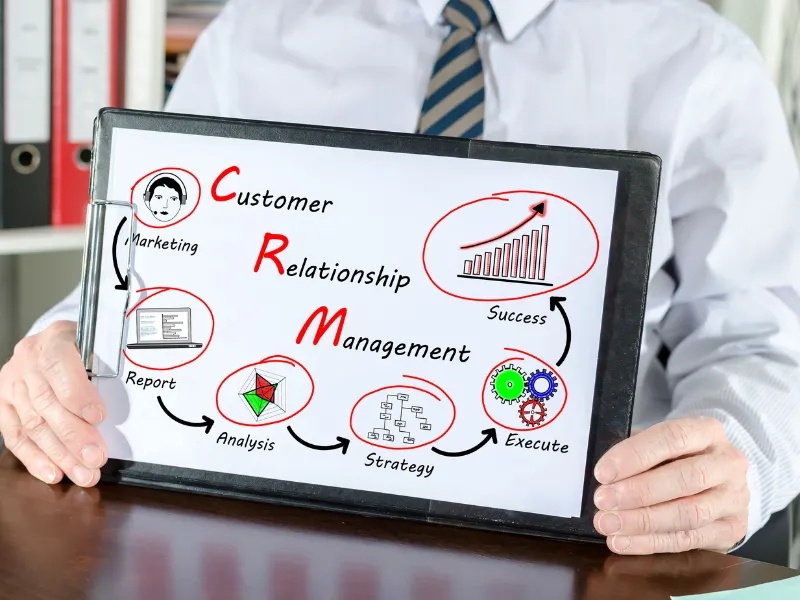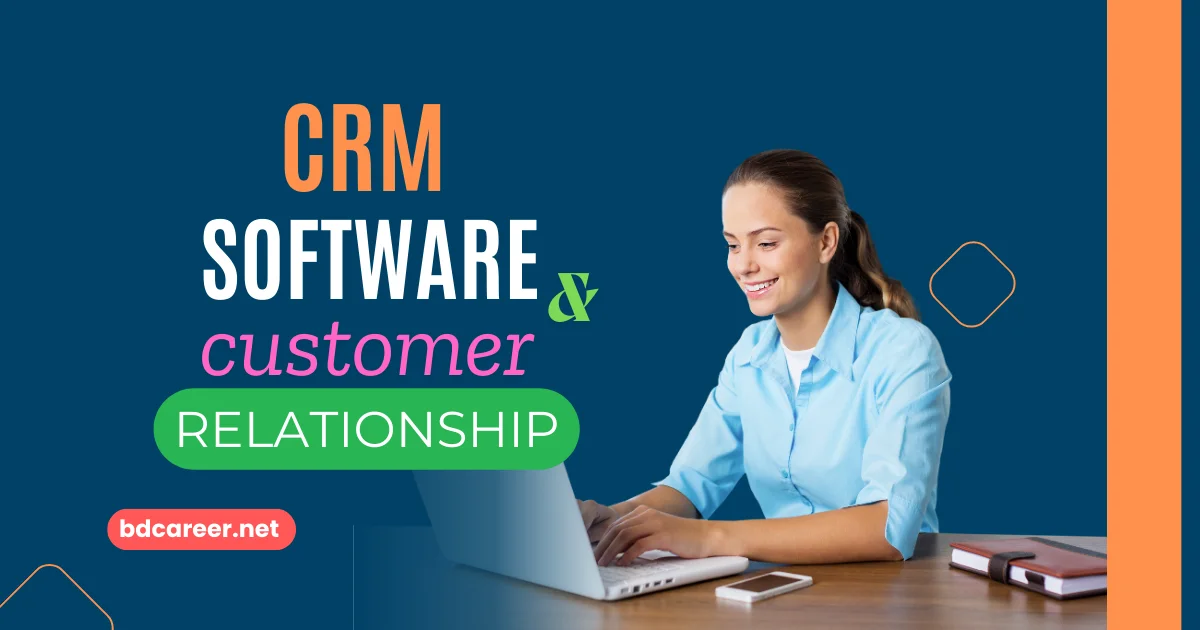Imagine entering your favorite coffee shop and the barista greeting you by name and creating your usual order before you speak. It feels amazing! That’s what CRM software does, but larger.
Customer relations management is essential in today’s fast-paced corporate world. Whether you manage a small or large business, tracking client interactions, preferences, and history is crucial to success. CRM software helps here.
Precisely, what is CRM software? Why is it so revolutionary for all businesses? This article will clearly describe CRM software’s definition, benefits, and features. Let’s begin!
Contents
What is CRM software?
CRM is a contact database. By centralizing, tracking, and managing interactions, CRM software helps companies build customer relationships.
CRM is like a digital Rolodex on steroids, automating sales processes, tracking consumer behavior, and personalizing experiences. Since handwritten client records and spreadsheets, CRM has evolved. Initially, firms tracked client interactions manually, but CRM systems evolved with technology. Cloud-based and AI-powered CRMs dominate the market, making it easier for companies to anticipate consumer needs and automate interactions.

Studies show that companies using CRM software increase sales by 29%. CRM helps teams organize, respond to client demands faster, and boost productivity. It also boosts client loyalty and retention by improving operational efficiency and making them feel valued.
Key Benefits of CRM Software
So, what exactly makes CRM software a must-have tool for businesses? Let’s break it down.
1. Stronger Customer Relationships
At its heart, CRM software is all about enhancing customer relationships. By keeping track of customer interactions, preferences, and feedback, businesses can:
- Personalize experiences – Send customized offers and messages based on customer history.
- Anticipate needs – Know what your customers want before they even ask.
- Provide seamless support – Ensure that every interaction, whether online or offline, feels smooth and effortless.
2. Improved Productivity & Team Collaboration
CRM software eliminates the chaos of scattered customer data by centralizing everything in one place. This means:
- Sales teams don’t waste time hunting for client information.
- Marketing teams can create targeted campaigns using real customer data.
- Customer service agents have instant access to past interactions, making problem resolution much faster.
3. Increased Sales & Revenue
One of the biggest advantages of CRM software is its ability to boost sales performance. Here’s how:
- Automated follow-ups ensure that no lead falls through the cracks.
- Lead scoring helps sales reps focus on high-value prospects.
- Data-driven insights allow businesses to refine their sales strategies for better conversion rates.
4. Data-Driven Decision Making
CRM software ensures that businesses have access to real-time data and analytics, allowing them to:
- Identify trends in customer behavior.
- Measure sales performance with accurate reports.
- Adjust marketing strategies based on actual customer interactions.
Core Features of CRM Software
CRM software is packed with features designed to improve efficiency and drive business growth. Here are some of the most essential ones:
1. Contact Management
At its simplest, CRM software stores and organizes customer information—including names, emails, phone numbers, and interaction history. This means businesses can:
- Quickly access client details.
- Track communication history across multiple touchpoints.
- Segment customers based on behavior and preferences.
2. Lead & Opportunity Management
Finding new customers is only half the battle—the real challenge is managing leads effectively. CRM software helps by:
- Tracking potential customers through different sales stages.
- Automating reminders for follow-ups.
- Assigning leads to sales reps based on priority.
3. Sales & Marketing Automation
CRM software eliminates tedious manual tasks by automating:
- Email campaigns
- Appointment scheduling
- Follow-up reminders
- Lead nurturing workflows
4. Advanced Analytics & Reporting
CRM tools come equipped with powerful analytics dashboards that provide insights into:
- Sales performance
- Customer behavior
- Marketing campaign effectiveness
5. Integration with Other Tools
Modern CRM systems seamlessly integrate with email, social media, and project management tools, making it easier to:
- Sync customer interactions across multiple platforms.
- Automate data entry from emails and calls.
- Connect with marketing software for targeted campaigns.

Types of CRM Software
There are three main types of CRM software, each designed for a specific purpose. Let’s break them down.
1. Operational CRM – The Efficiency Expert
This type of CRM is all about streamlining operations. Think of it as the ultimate task manager, handling everything from sales automation to customer service. It’s perfect for businesses looking to:
- Automate sales processes
- Manage customer interactions seamlessly
- Improve response times with chatbots and ticketing systems
Popular operational CRM tools: Salesforce, HubSpot, Zoho CRM
2. Analytical CRM – The Data Scientist
If numbers and insights excite you, analytical CRM is your best friend. This type of CRM focuses on data analysis, helping businesses understand customer behavior and forecast trends. It’s ideal for:
- Identifying customer preferences and buying habits
- Running targeted marketing campaigns
- Making data-driven decisions
Popular analytical CRM tools: SAP CRM, Pipedrive, Microsoft Dynamics
3. Collaborative CRM – The Team Player
For businesses that value teamwork, collaborative CRM ensures seamless communication across departments. No more silos—just shared customer data, smoother workflows, and better decision-making.
- Improves customer service with shared data
- Aligns sales, marketing, and customer support
- Supports multi-channel customer engagement
Popular collaborative CRM tools: Freshworks CRM, Zendesk, Bitrix24
How to Choose the Right CRM Software
Choosing the right CRM software is a game-changer for any business, but with so many options out there, it can feel overwhelming. The key is to align your CRM choice with your business goals, ensuring it meets your needs without overcomplicating workflows. Let’s break down the essential steps to finding the perfect CRM solution.

Step 1: Assess Your Business Needs
Before diving in, ask yourself the right questions:
- Choose a CRM with lead and sales automation features.
- Look for a CRM with ticketing and support tools.
- Opt for a CRM that offers advanced reporting and AI-driven insights.
Step 2: Key Factors to Consider
- Ease of Use – The CRM should be intuitive and easy to navigate for your team.
- Scalability – Ensure the CRM can grow with your business needs.
- Customization – Look for options to customize workflows, fields, and reports.
- Integration Capabilities – The CRM should connect with your existing tools (email, accounting, marketing platforms, etc.).
- Automation Features – Helps save time by automating repetitive sales, marketing, and customer service tasks.
- Pricing & Budget – Consider affordability based on your team size and business stage.
- Customer Support – Reliable support (live chat, phone, or dedicated account managers) is essential.
- Mobile Accessibility – A CRM with a mobile app ensures on-the-go access for sales teams.
- Data Security & Compliance – Protect customer data and comply with industry regulations (GDPR, HIPAA, etc.).
- Reporting & Analytics – Advanced analytics help track performance and improve decision-making.
Step 3: Popular CRM Tools and Their Strengths
To make your decision easier, here’s a quick comparison of some top CRM solutions:
CRM Tool | Best For | Pricing |
HubSpot CRM | Startups & Small Businesses | Free & Paid Plans |
Salesforce | Large Enterprises & Custom Needs | Premium Plans Only |
Zoho CRM | Affordable & Customizable | Budget-Friendly |
Pipedrive | Sales-Focused Teams | Mid-Range Pricing |
Freshsales | Customer Support & Automation | Mid-Range Pricing |
Conclusion
By now, you should have a clear idea of the different types of CRMs and how to pick the right one. Whether you need a data-driven CRM, an automation powerhouse, or a teamwork enhancer, the perfect solution is out there.
The secret to CRM success? Choose one that fits your business goals, budget, and team workflow. And remember—a CRM is only as good as how well your team uses it!
So go ahead, start exploring, and take your customer relationships to the next level.
FAQ
What is the primary objective of CRM software?
CRM software enables firms to manage client connections, measure interactions, and increase sales and service efficiency. It centralizes consumer data, automates workflows, and gives important insights to improve decision-making.
Is CRM software only for large businesses?
No! CRM software assists organizations of all sizes, from sole proprietors to multinational corporations. Many platforms provide scalable solutions, allowing you to start small and expand as your organization grows.
Can a CRM help you with marketing?
Absolutely! Most CRMs have built-in marketing features for email campaigns, customer segmentation, and performance tracking. Analytical CRMs provide precise information on marketing effectiveness.
How much does a CRM generally cost?
CRM prices vary widely. Some platforms (such as HubSpot) provide free options, while others charge $10 to $100 per user each month, depending on features and scalability. It is best to try a free trial before making a final selection.
What is the most significant mistake firms make when selecting a CRM?
Not considering long-term scalability. Many firms choose a CRM based on their present requirements but outgrow it within a year. Always select a solution that can grow with your business.
Can I interact with my CRM and other business tools?
Yes! Modern CRMs work with email, social networking, accounting software, and project management tools, allowing for seamless data flow across various business operations.
